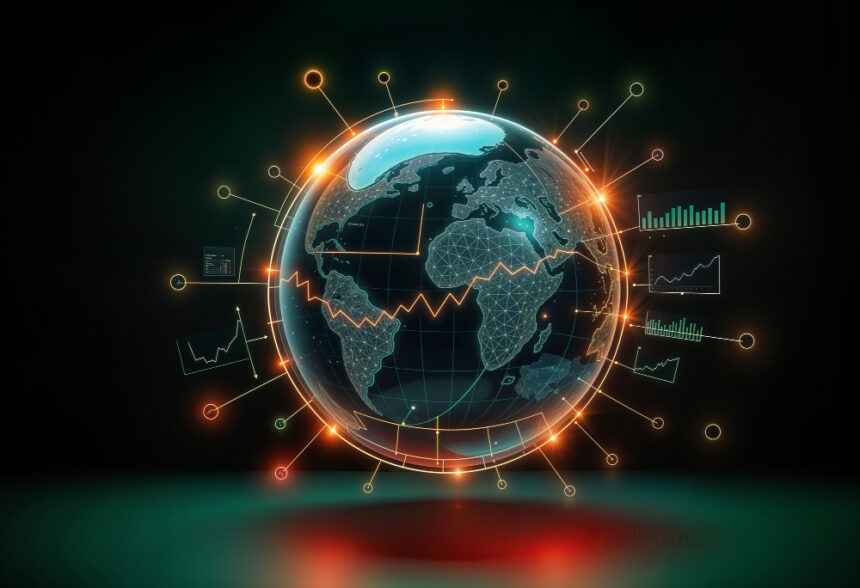The year 2025 is shaping up to be a pivotal moment in global developments. Across economies, societies, and technologies, various inflection points are emerging that could redefine how we live, work, and interact. Understanding these shifts is crucial for businesses, policymakers, and individuals aiming to navigate an increasingly complex world. In this article, we explore seven critical global inflection points, providing insights into the trends that are expected to shape the future.
1. Economic Realignment
Global economies are undergoing a major realignment as new markets emerge and traditional powerhouses face structural changes. Growth in regions like Southeast Asia and Africa is creating new opportunities, while established economies are grappling with slowing growth and shifting demographics. The inflection points in economic power are influencing trade patterns, investment strategies, and labor markets, making it essential for businesses to adapt their strategies.
As inflation, interest rates, and currency fluctuations continue to affect global markets, companies must pay close attention to how these economic inflection points impact both consumer behavior and corporate operations. Businesses that can anticipate changes and pivot effectively are likely to gain a competitive edge.
2. Technological Acceleration
The rapid pace of technological innovation is another significant inflection point in 2025. Advancements in artificial intelligence, quantum computing, and automation are reshaping industries, from healthcare to manufacturing. Organizations are increasingly relying on digital transformation to stay ahead, with technology acting as both a driver of growth and a disruptor.
The adoption of emerging technologies is creating new market dynamics, altering supply chains, and changing the skill sets required for the workforce. Staying informed about these technological inflection points is crucial for decision-makers seeking to leverage innovation for competitive advantage.
3. Climate and Environmental Shifts
Climate change continues to be a defining inflection point for governments, corporations, and communities. Extreme weather events, rising sea levels, and resource scarcity are forcing a reevaluation of environmental policies and business practices. Companies are now focusing on sustainability, reducing carbon footprints, and implementing circular economy strategies to adapt to these challenges.
The environmental inflection points of 2025 are also influencing consumer preferences, with more individuals favoring eco-friendly products and responsible brands. Businesses that align with these shifts are likely to build long-term trust and loyalty.
4. Geopolitical Transformations
The global political landscape is in flux, with new alliances, conflicts, and policy shifts creating critical inflection points. Trade tensions, international negotiations, and regional conflicts are reshaping economic and strategic priorities for nations and corporations alike. Understanding these geopolitical changes is essential for risk management and strategic planning.
Geopolitical inflection points influence not only markets but also supply chains, investment flows, and regulatory environments. Companies that remain agile and informed are better positioned to navigate these uncertainties and capitalize on emerging opportunities.
5. Social and Cultural Evolution
Shifts in demographics, values, and cultural norms represent another set of inflection points in 2025. Increasing urbanization, generational changes, and evolving social attitudes are affecting everything from consumer behavior to workplace dynamics. Businesses must adapt to these changes to remain relevant and engage effectively with their audiences.
The social and cultural inflection points are also shaping policy decisions, marketing strategies, and product development. Companies that understand and respond to these trends can better anticipate market demands and enhance brand loyalty.
6. Healthcare and Biotechnology Advancements
Healthcare innovation is accelerating rapidly, creating critical inflection points in 2025. Advances in biotechnology, personalized medicine, and telehealth are transforming patient care and medical research. These developments are reshaping healthcare delivery models and opening new avenues for investment and collaboration.
The healthcare inflection points also influence workforce health, regulatory frameworks, and insurance models. Organizations that leverage these insights can improve employee wellbeing, reduce operational risks, and capitalize on new business opportunities.
7. Digital Economy Expansion
The growth of the digital economy represents a major inflection point in 2025. E-commerce, digital currencies, and online services are increasingly integral to economic activity. Businesses that embrace digital transformation and develop robust online platforms can capture emerging market opportunities.
Digital economy inflection points also drive innovation in marketing, customer engagement, and data analytics. Companies that harness these trends can optimize operations, enhance customer experiences, and maintain a competitive edge in a rapidly evolving market.
Understanding and responding to these seven global inflection points is essential for navigating the complexities of 2025. By analyzing economic, technological, environmental, geopolitical, social, healthcare, and digital trends, businesses and individuals can make informed decisions and seize opportunities in a dynamic world.
Keyword: Inflection points







